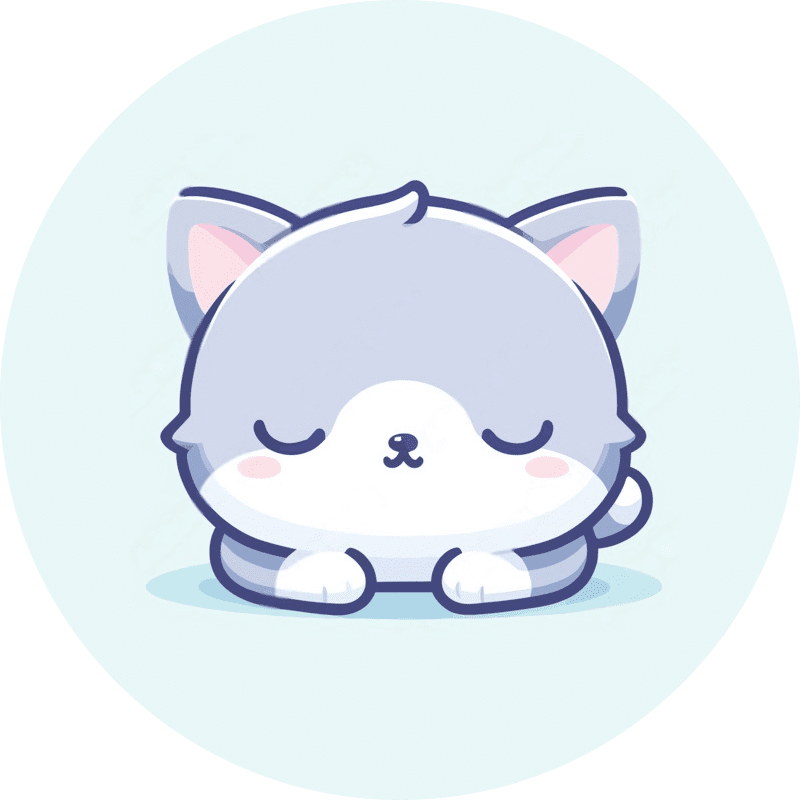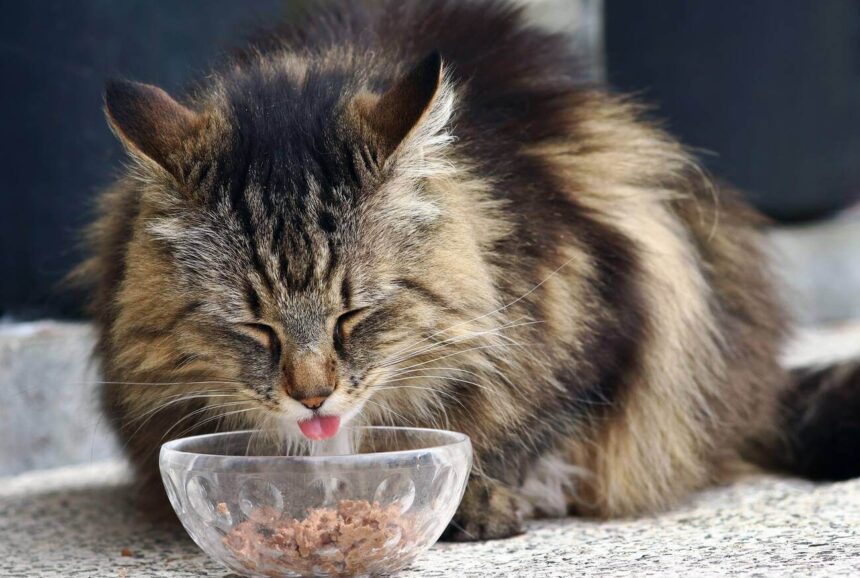Can wet cat food cause diarrhea? That is a common question that I get asked from people with cats. Too much water in the food can cause diarrhea and dehydration in cats, but some people still feed their cat’s wet food without a problem.
The main reason why most cats are fed wet cat food is because of the high water content. The water content helps to meet the cats’ daily fluid requirement, and it also helps with weight control.
Most pet owners feed their cats wet food because they see that their pet eats it without a problem or because they are especially concerned about their pet’s bladder health. Wet cat food does not cause health problems per-se, but the potential for health problems with wet cat food exists.
Stool contains a significant amount of water, which can contribute to dehydration, and dehydration can lead to clinical signs such as vomiting and diarrhea. Dehydration occurs when there is too much water in the stool, also called stool having a large volume or high water content.
Can Wet Food Cause Diarrhea In Cats?
It is normal to have cat diarrhea from wet food occasionally, but in most cases, wet cat food is not the cause of the problem.
The main reason for diarrhea from a wet cat food can be attributed to the high water content. A stool with a large volume or high water content can contribute to dehydration or a large volume, which can also lead to clinical signs such as vomiting and diarrhea. Crows’ uncontrolled diarrhea from eating wet cat food can lead to dehydration.
Dry cat food has a water content of about 10%, which is less than the water content in wet cat food. The dry cat food stool is formed and can retain the stool shape better, whereas wet cat food contains more water, and the stools become loose, mushy, or soft.
Stool consistency is due to water content, which is one of the reasons why cats with diarrhea from wet food do better when fed dry cat food for a few days.
The stool of wet cat food has a larger volume or high water content, which means the stool has more fluid contents than dry cat food. The water from a wet cat food can make the stools softer and mushier, contributing to cat dehydration.
Rich in Protein and Fat
Cats are obligate carnivores, meaning they need meat to thrive. Wet food usually has a high protein and fat content, which is fantastic. However, not all cats can handle the richness, especially if they’re not used to it. This richness can overwhelm their digestive system, leading to gas, bloating, and yes, diarrhea.
Ingredients and Additives
Not all wet foods are created equal. Some contain fillers, artificial flavors, or preservatives that might not sit well with your cat’s tummy. Cats can be sensitive creatures, and even a small change in their diet can cause a big reaction.
Cat has diarrhea after eating wet food?
Diarrhea is one of the clinical signs associated with dehydration in cats. The amount of water in the stools can indicate how much dehydration a cat has. A stool with a large volume or high water content indicates more fluid in the stool, which means more fluid is being excreted from the body.
Cat diarrhea after eating wet food can be attributed to other causes of diarrhea besides dehydration. Some cat owners have attributed diarrhea to changes in diet or dry food, although this is not the cause of illness.
Some cat owners experience diarrhea from wet food because of changes in diet. Dry cat food contains more protein than wet food and can cause constipation or diarrhea for some cats. Some cats can develop nausea, vomiting, and dehydration from eating dry cat food, which is why some cats may be reluctant to eat wet cat food.
Symptoms of Wet Food-Induced Diarrhea
So, how do you know if your cat’s diarrhea is caused by wet food? Here are some tell-tale signs:
Dehydration: Watch for signs like dry gums, sunken eyes, and increased thirst. Diarrhea can quickly lead to dehydration in cats.
Frequent Loose Stools: If your cat is having multiple episodes of loose, watery stools, it’s a sign something is amiss.
Straining: Your kitty might be straining to go, which can indicate irritation or discomfort.
Lethargy: Diarrhea can take a lot out of a cat, literally. If your usually energetic furball is suddenly lethargic, pay attention.
My cat has diarrhea after eating wet food. What should I do now?
If you’ve determined that wet food might be the culprit behind your cat’s diarrhea, don’t worry! There are several steps you can take to help your kitty feel better:
Pause the Wet Food
First things first, give your cat’s tummy a break from the wet food. Switch to dry food for a few days and see if there’s an improvement. This can help solidify their stools and give their digestive system a chance to recover.
Less Moisture
Consider offering foods with less moisture content. This can help in balancing the digestive process and reducing the chances of diarrhea.
Offer Bland Foods
You can try feeding your cat bland foods like boiled chicken or plain rice. These are easy on the stomach and can help firm up their stools. Just make sure there’s no seasoning or additives, as these can further irritate their tummy.
Mix It Up
Introduce some variety into your cat’s diet. Canned or fresh foods, especially when your kitty isn’t using the litter box, can be a refreshing change.
Hydration is Key
Keep your cat well-hydrated. Offer plenty of fresh water and consider adding a bit of water to their dry food to ensure they’re getting enough fluids. Dehydration can make diarrhea worse and lead to other health issues.
Separate the Wet and Dry
If you’re feeding both wet and dry food, try serving them at different times or in separate bowls. This can help manage your cat’s diet effectively.
Monitor Ingredients
Take a close look at the ingredients in your cat’s wet food. Avoid foods with artificial additives, fillers, and preservatives. Opt for high-quality, grain-free options with real meat as the primary ingredient. Your cat’s tummy will thank you!
Cut Back on Portions
If your cat has a sensitive stomach, consider reducing the quantity of wet food in their diet. Sometimes, a little less indulgence can make a big difference.
Consistent Feeding Schedule
Keep your cat’s feeding schedule consistent. Regular meal times can help regulate their digestive system and prevent diarrhea. Avoid free-feeding, as it can lead to overeating and digestive upset.
Gradually Reintroduce Wet Food
Once your cat’s stools have firmed up, you can start reintroducing wet food slowly. Mix a small amount with their dry food and gradually increase the proportion of wet food over several days. This gives their digestive system time to adjust.
Consult Your Vet
If diarrhea persists despite your best efforts, it’s time to consult your vet. There could be an underlying health issue that needs to be addressed. Your vet can provide guidance and recommend a suitable diet for your cat’s specific needs.
Under the Weather Anti-Diarrhea Liquid for Cats
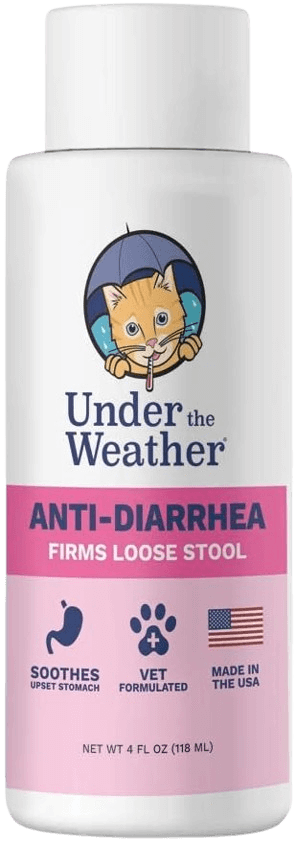
Can Changing Cat Food Cause Diarrhea?
Changing cat food can cause diarrhea if the cat has a sensitive stomach. Switching from one type of cat food to another can upset your pet’s digestive system. The more often you switch their diet, the more likely this will happen. If you find that changing your cats’ diet causes problems, stick with one brand for a week or two before moving to another one.
5 Best wet food for cats with diarrhea
Here are the 5 best wet food for cats with diarrhea:
1. Hill’s Prescription Diet Feline i/d
Hill’s Prescription Diet Feline i/d is the highest reviewed wet food on Amazon, with a rating of 4.7 out of 5 stars. This is a prescription food that is clinically tested, veterinarian formulated and contains real chicken and other high-quality ingredients.
This product contains antioxidants, prebiotics, probiotics, and vitamins. The ingredients are designed to target flea allergies and restore the gastrointestinal tract in cats.
This is the best wet food for cats with diarrhea because it contains no artificial colors or flavors and has no corn, wheat, or soy ingredients.
2. Royal Canin Feline Health Nutrition Digest Sensitive
Royal Canin Feline Health Nutrition Digest Sensitive is the second highest reviewed wet food on Amazon, with a rating of 4.5 out of 5 stars. This product is designed for cats and kittens sensitive to certain foods and ingredients like artificial colors, flavors, chicken, and beef.
This product contains omega 3 and omega 6 fatty acids to help skin health, restore the hair coat and maintain a healthy digestive system. Royal Canin also uses functional proteins for skin and coat health in pets.
3. Fancy Feast Cans with Tuna
Fancy Feast Cans with Tuna is the third highest reviewed wet food on Amazon, with a rating of 4.2 out of 5 stars. This high-quality canned cat food contains real tuna and chicken, natural flavors, and vitamins.
The wet cat food contains no artificial colors, flavors, or preservatives. They can also have several months’ shelf life, so you don’t have to worry about hidden ingredients that are sometimes found in other canned cat foods.
4. Friskies Pate Ocean Whitefish and Tuna Dinner
Friskies Pate Ocean Whitefish and Tuna Dinner is the fourth highest reviewed wet food on Amazon, with a rating of 4.0 out of 5 stars. This product is grain free and contains natural ingredients like ocean whitefish, tuna, chicken broth, and vitamins.
This is an easy-to-digest cat food designed for cats with sensitive stomachs. The cans are made especially for adult cats and young kittens over 6 months old. This product contains no artificial flavors, colors, or preservatives.
5. Weruva Paw Lickin Chicken and Liver Dinner
Weruva Paw Lickin Chicken and Liver Dinner is the fifth highest reviewed wet food on Amazon, with a rating of 4.0 out of 5 stars. This brand makes healthy, nutritious, and delicious cat treats for cats with special dietary needs and those who have suffered from diarrhea.
This product contains a unique formula with ingredients like green tea, vitamins, and minerals to help your cat have a healthy immune system. This is the best wet food for cats with diarrhea because it contains no artificial colors, flavors, or preservatives.
You probably wonder what ingredients cause cat diarrhea and if you should feed wet food.
It’s important that you don’t feed your cats store-bought cat foods because they are sometimes contaminated with bacteria, which can cause digestive problems in cats.
Store-bought cat foods are often contaminated with antibiotics and other chemicals that aren’t healthy for cats to consume regularly. These types of ingredients include artificial colors and flavors, as well as preservatives and other additives that can be irritating to pets’ digestive systems.
Why does my cat get diarrhea from wet food?
There are some reasons why cats get diarrhea from wet food.
Sometimes cats get diarrhea just because they are sensitive to a certain ingredient or food. If your cat is sensitive to a certain ingredient or flavor, it’s best to feed them a different type of food designed for cats with sensitive stomachs.
If your cat is on a special diet, you should avoid giving them foods with unnatural ingredients. This can trigger allergic reactions in your pet and cause diarrhea.
If your cat is not on an important diet, you may want to avoid feeding them wet food or any other types of cat food that contain ingredients that cats shouldn’t be eating.
Some foods can also cause allergic reactions in cats, and this can also cause diarrhea. For example, if your cat is allergic to beef, they are more likely to have diarrhea when they eat beef-based foods.
Should I stop giving my cat wet food if they have diarrhea?
If you’re trying to feed your cat high quality food that is just like the wet food they were eating when they got diarrhea, then you should avoid giving them store-bought cat foods, as they are often contaminated with chemicals that can cause problems.
If your cat is on a special diet, it’s best to avoid giving them any canned or dry cat foods. Canned foods are processed using heat and chemicals that can harm cats.
If your cat isn’t allergic to anything specific, you should feed them wet food. Canned foods are often a great source of protein for cats, but if you want to feed them higher quality food like the wet food they were getting when they got diarrhea, then you should provide them with a prescription for all-natural cat food.
If your cat has diarrhea from wet food, you may want to change their diet to something healthier and more natural. Just remember that cats can only eat certain foods, and it’s important that you don’t give them things that can cause problems for their digestive system.
Preventing Wet Food-Related Diarrhea
Prevention is always better than cure. Here are some tips to prevent wet food-related diarrhea in your cat:
Start with Small Portions
When introducing wet food to your cat’s diet, start with small portions. This allows their digestive system to adjust gradually. You can gradually increase the amount as their tummy gets used to it.
Mix Wet and Dry Food
Combining wet and dry food can provide the benefits of both while minimizing the risk of diarrhea. It can also make the transition easier for your cat.
Watch for Allergies
Pay attention to any signs of allergies or sensitivities. If your cat develops diarrhea, itching, or other symptoms after eating certain wet foods, they might be allergic to an ingredient. Switch to a different formula and see if the symptoms improve.
Feed a Balanced Diet
Ensure your cat’s diet is balanced and meets their nutritional needs. Consult your vet to determine the best diet for your cat’s age, weight, and health condition. A well-balanced diet supports overall health and digestion.
Maintain Hygiene
Proper food hygiene is essential. Always store wet food in the refrigerator and use it within the recommended time frame. Wash your cat’s food and water bowls regularly to prevent bacterial growth.
Wet Food Myths and Facts
Let’s bust some myths and uncover the facts about wet food and diarrhea:
Myth: All Wet Food Causes Diarrhea
Not true! While wet food can cause diarrhea in some cats, it’s not a universal rule. Many cats thrive on wet food without any issues. It’s all about finding the right balance and ingredients that work for your kitty.
Fact: Gradual Changes Are Best
Switching your cat’s food suddenly can lead to digestive upset, including diarrhea. Always introduce new foods gradually, mixing them with their current food and slowly increasing the amount over time. This helps their digestive system adjust.
Myth: Dry Food is Always Better
Dry food isn’t inherently better than wet food. Both have their pros and cons. Wet food provides hydration and is often more palatable, while dry food is convenient and can help with dental health. The key is to find the right balance for your cat.
Fact: Quality Matters
The quality of the food you feed your cat is crucial. High-quality wet foods with real meat, minimal fillers, and no artificial additives are less likely to cause digestive issues. Invest in good food for your furry friend!
When to Seek Veterinary Help
While occasional diarrhea can be managed at home, there are times when it’s crucial to seek veterinary help:
Persistent Diarrhea
If your cat’s diarrhea lasts more than a couple of days, it’s time to consult your vet. Persistent diarrhea can lead to dehydration and other complications.
Blood in Stools
Blood in your cat’s stools is a red flag. It could indicate a serious underlying condition that needs immediate attention. Don’t wait; contact your vet right away.
Lethargy and Vomiting
If your cat is lethargic, vomiting, or showing signs of severe discomfort along with diarrhea, seek veterinary help. These symptoms can indicate a more serious issue that requires prompt treatment.
Weight Loss
Unexplained weight loss along with diarrhea is a concern. It could indicate a chronic issue that needs to be addressed. Your vet can perform tests to determine the cause and recommend appropriate treatment.
FAQs: Can Wet Food Cause Diarrhea in Cats?
Does wet food cause diarrhea in cats?
Yes, wet food can potentially cause diarrhea in cats, especially if they have a sensitive stomach or if their diet is suddenly changed. The high moisture content and rich protein and fat levels in wet food can sometimes upset their digestive balance.
Is wet food worse for causing diarrhea compared to dry food?
The simple answer is really no. Any kind of cat food can cause diarrhea in cats, whether it’s wet or dry. It’s more about the specific ingredients in the food itself. A lot of owners worry that the extra water in wet food will give their cats diarrhea, but that’s usually not the case.
If you switch your cat’s diet from dry to wet and notice some diarrhea, it’s probably not the wetness that’s causing the issue. It’s more likely something in the new food that doesn’t sit well with your cat’s stomach.
Dry food can cause diarrhea too, often because it’s very acidic. Cats can be really sensitive to acidity. So, if your kitty’s having tummy troubles with dry food, that might be the reason.
Does canned cat food cause diarrhea in cats?
Yes! Canned food can indeed cause diarrhea in cats. In fact, any type of cat food, whether it’s dry or wet, has the potential to upset your kitty’s tummy.
Canned cat food is often seen as a healthier option compared to raw meat because it lacks preservatives and is produced in a controlled environment. However, like all processed foods, canned cat food can sometimes cause digestive issues.
If canned food is causing persistent diarrhea, a homemade diet might be worth trying. Canned foods often contain high levels of sugars and fillers that could trigger irritable bowel syndrome in your pet. Raw meats, on the other hand, provide better nutrition without hidden ingredients.
Pet Ultimates Probiotics for Cats – 20-Species Cat Probiotic Powder to Treat Diarrhea

Can Wet Cat Food Cause Loose Stools?
Noticed your cat has soft stools (loose stools) and you feed them wet cat food? Yeah, it might be the culprit. Cats can get diarrhea or loose stools from the food they eat, and wet cat food is often high in water content and lacks some of the nutrients found in dry food, making it less balanced.
If your cat has loose stools, there could be a bunch of reasons behind it:
- Upset Stomach or GI Conditions: These can cause abdominal discomfort and lead to loose stools.
- Obesity: An overweight cat’s GI tract can be more sensitive to the foods they eat.
- Irritation: Things like hairballs or a foreign object lodged in the intestine can cause irritation and result in diarrhea.
- Trauma: A change in diet or trauma to the small intestines can lead to loose stools.
- Food Aversion: Sometimes, a cat just doesn’t like the taste of a certain food, which can upset their stomach and cause diarrhea.
Can kittens or older cats get diarrhea from too much wet food?
Both kittens and older cats can experience diarrhea if they consume excessive wet food. It’s important to monitor your cat’s diet and adjust it to suit their specific needs.
Sheba Perfect Portions Cuts in Gravy Wet Cat Food
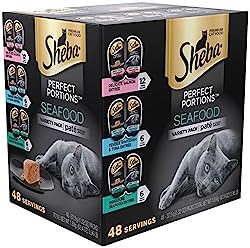
How long should I expect my cat to have diarrhea after changing its food?
The duration of diarrhea after changing your cat’s food can vary depending on the cat’s specific situation. Typically, a cat may start to eliminate the wet food within 12 hours of transitioning to it.
Can wet food cause diarrhea during pregnancy or after giving birth?
Yes, wet food can potentially cause diarrhea in pregnant cats or cats after giving birth. Hormonal changes and dietary alterations during these times can sometimes lead to gastrointestinal issues.
Can too much wet food cause diarrhea in cats?
Yes, too much wet food can cause diarrhea in cats because it often contains high levels of moisture and certain ingredients that may upset their digestive system, leading to loose stools. If a cat’s diet is not balanced or if they are overfed with wet food, it can result in gastrointestinal issues such as diarrhea. It’s important to maintain a balanced diet and monitor their food intake to prevent such problems.
What’s the best wet cat food for sensitive stomach diarrhea?
If your cat has diarrhea, it’s advisable to feed them lean meat, canned cooked meat, or even brown rice and boiled chicken without the skin. These options are easier on the digestive system.
Wilderness High Protein Grain Free, Natural Adult Pate Wet Cat Food
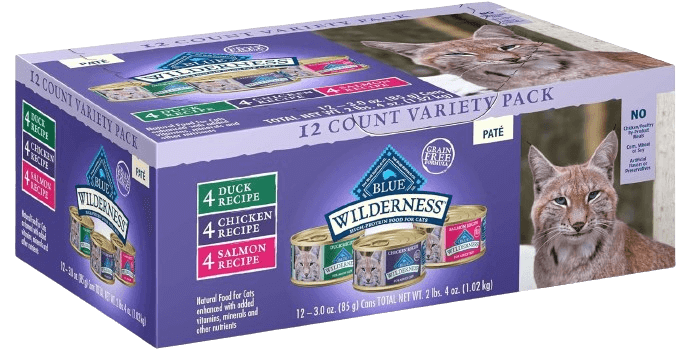
Are wet foods harmful to cats?
Wet food itself is not harmful to cats. The potential for harm lies in the specific ingredients and the cat’s individual sensitivities. High-quality wet foods, when well-tolerated, can be a part of a healthy feline diet.
Final Thoughts: Can Wet Food Cause Diarrhea In Cats?
In conclusion, can wet food cause diarrhea in cats? Yes, it can, but it’s not a given. Many cats enjoy wet food without any issues, while others might have sensitive tummies that react to certain ingredients or the richness of the food. The key is to monitor your cat’s reaction, make gradual dietary changes, and choose high-quality food.
Remember, every cat is unique. What works for one might not work for another. Pay attention to your kitty’s needs and consult your vet if you have any concerns. With a little care and attention, you can ensure your furry friend stays happy, healthy, and well-fed.
